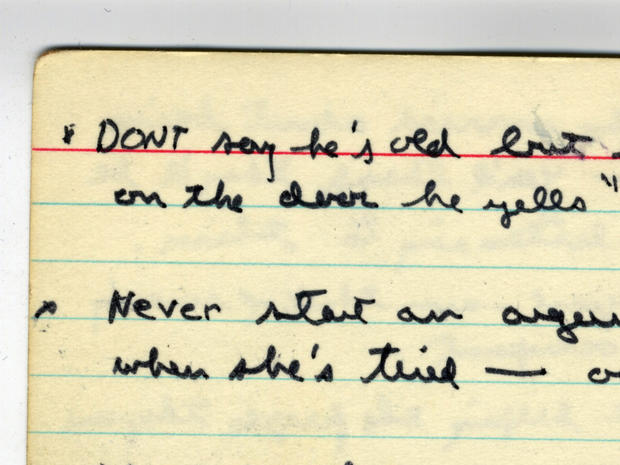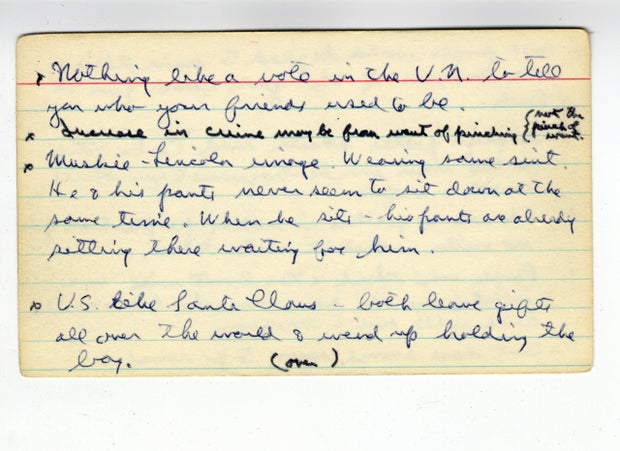No such care in sourcing was needed for the time-tested jokes: “Those congressmen who worry about being bugged by the FBI—you’d think they’d be glad someone was listening to them.”
Reagan, however, did not source many of his one-liner jokes.
No such care in sourcing was needed for the time-tested jokes: “Those congressmen who worry about being bugged by the FBI—you’d think they’d be glad someone was listening to them.”
Reagan, however, did not source many of his one-liner jokes.
Ronald Reagan's index cards of one-liners at 2014-07-20 <br /> (accessed:: 2023-02-23 11:41:42)
archived version: https://web.archive.org/web/20200305070906/https://www.cbsnews.com/pictures/ronald-reagans-index-cards-of-one-liners/12/
ᔥ Manfred Kuehn in Ronald Reagan's Notecards at 2015-01-25<br /> (accessed:: 2023-02-23 11:34:10)
"There's little danger of our government being overthrown – there's too much of it."
—Ronald Reagan
Little would he have expected January 6th...
"It's a great kindness to entrust some one with a secret. They feel so important while telling it."
—Ronald Reagan
"Easier to forgive someone if you get even with them first."
—Ronald Reagan
"Used to talk our problems over cigarettes and coffee. Now cigarettes and coffee ARE our problems."
—Ronald Reagan
"The art of politics is making people like you, no matter what it costs them."
—Ronald Reagan
"Room bugged? Every time I sneezed the chandelier said, 'Gesundheit!'"
—Ronald Reagan
"Never start an argument with a woman when she's tired -- or when she's rested."
—Ronald Reagan

"Don't say he's old, but every time there's a knock on the door he yells 'Everybody hide, it's Indians!'"
—Ronald Reagan
"Nothing like a vote in the U.N. to tell you who your friends used to be."
—Ronald Reagan

Manfred Kuehn in Ronald Reagan's Notecards at 2015-01-25<br /> (accessed:: 2023-02-23 11:34:10)
Kuehn felt that Ronald Regan's note taking "does not seem like a good system. In fact, it's hardly any system at all..."
Ronald Reagan notecard


netstat -tn 2>/dev/null | grep :80 | awk '{print $5}' | cut -d: -f1 | sort | uniq -c | sort -nr | head
instance_eval { reduce(:+) / size.to_f }
0</dev/null script --quiet --flush --return --command "$(printf "%q " "$@")" /dev/null
A one-liner alternative for hash-only cases can be implemented using Enumerable#reduce: root = {} [:a, :b, :c].reduce(root){@1[@2]||={}}[:d] = 'E' # root => {:a=>{:b=>{:c=>{:d=>"E"}}}}
yell() { echo "$0: $*" >&2; } die() { yell "$*"; exit 111; } try() { "$@" || die "cannot $*"; }
I'm certainly not claiming that we should use clever tricks to scrunch our code into the most compact form possible at the expense of readability. Nor am I claiming that reducing lines of code is necessarily a worthwhile goal, since it encourages turning readable code like this...